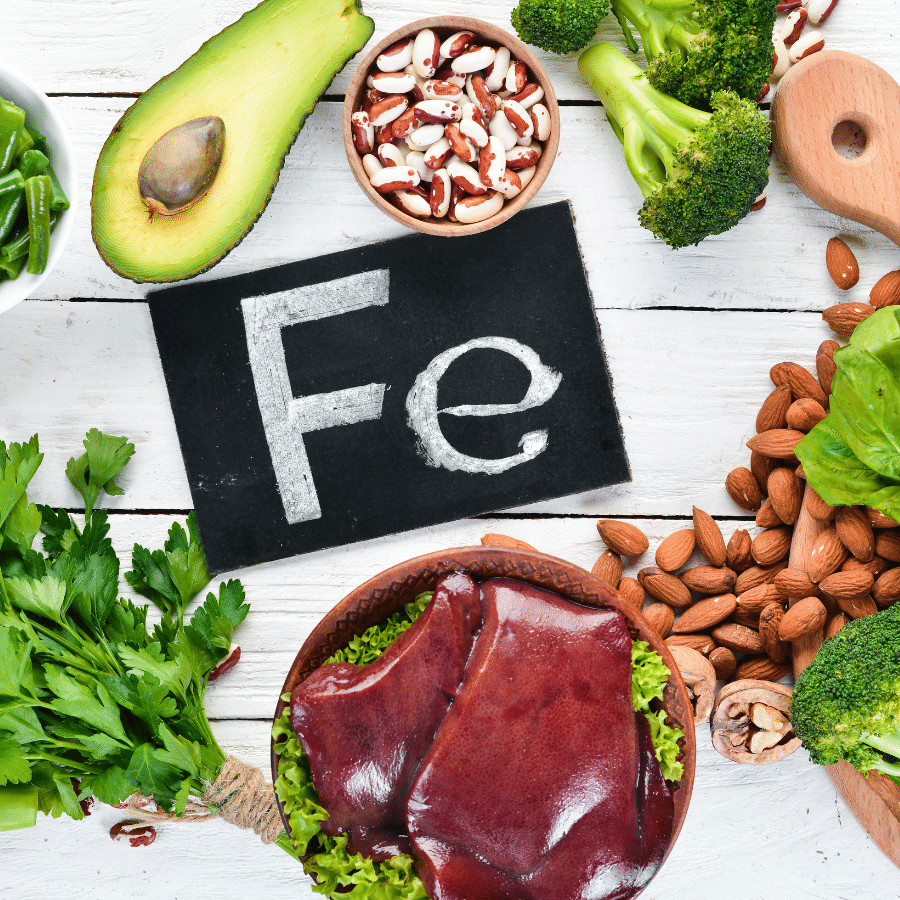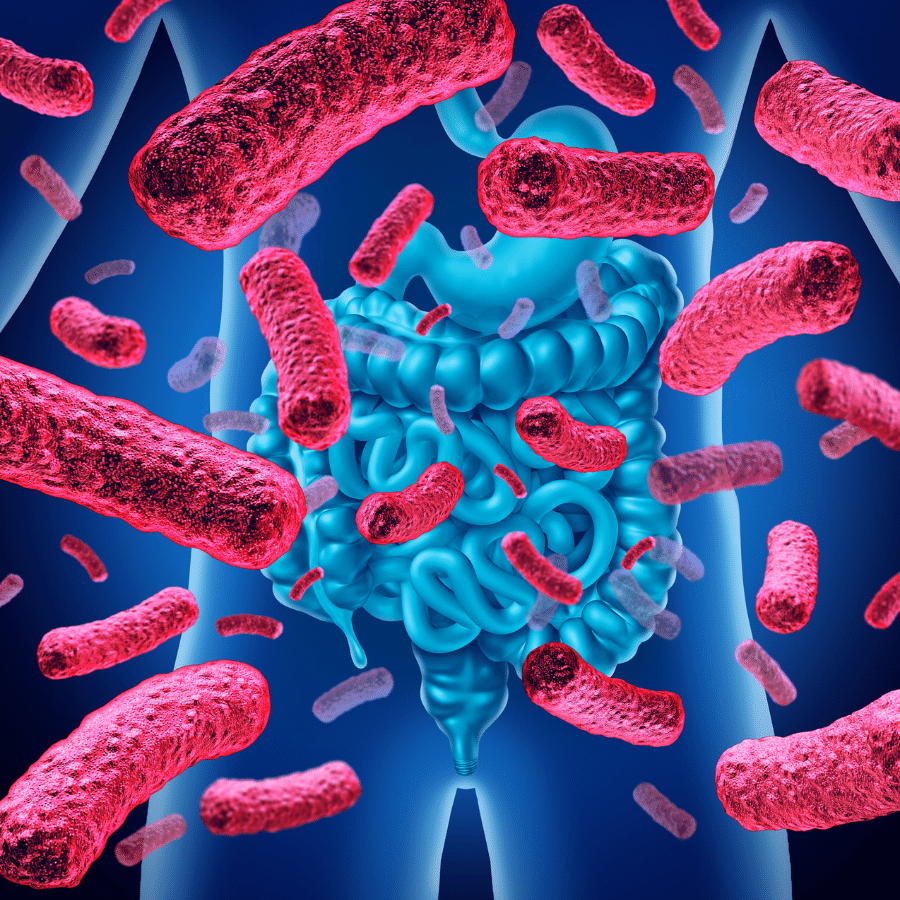Did you know your body is really smart?
Well it is! It’s so, so smart.
We often think when we’re not feeling good or have complaints about our bodies that they are messed up.
But really, your body is just responding to the situations presented. It’s just trying to survive.
I feel like a broken record sometimes but this is worth stating over and over. The human body is so complex!
One example of the complexity of the body is when we’re dealing with anemia.

Have you ever been told you’re anemic, or maybe borderline?
You might experience a lot of fatigue, get easily out of breath, get dizzy, have cold hands and feet, and irregular heartbeats, to name a few symptoms.
Anemia is when the blood is not carrying enough oxygen to the rest of the body. The red blood cells use a substance called hemoglobin to carry oxygen.
Anemia can be seen if there are two few red blood cells or not enough hemoglobin in those red blood cells.
To make hemoglobin, the cells need iron.
So, if hemoglobin is low, which is usually the case with anemia, increasing iron should fix the problem, right?
Not always! And I’d even go so far as to say most of the time, supplementing iron is not the best option.
Iron is an incredibly important mineral that the body can’t live without. But like many nutrients in the body, it needs to be in balance with other vitamins and minerals.
There are multiple forms of anemia, and iron-deficiency is only one of them. Taking iron when you’re not actually deficient in iron can be problematic. Taking iron without taking other factors into account can also be problematic at times.
And even if you have iron-deficient anemia, taking supplemental iron STILL might not be the best course of action.
We need to take the whole body into account and what else is going on.
Regardless of the type of anemia someone has, there is something we have to consider…

Gut bacteria are iron-eaters
One interesting tidbit about iron is that not only do we as humans need iron, but the microbes living in your gut do as well, especially the unfriendly ones! As I’ve talked about before (and will continue to do so!), there is a vast ecosystem living in your gut. You will always have a mix of friendly and pathogenic microbes living in your intestines.
Iron helps keep those various pathogenic microbes like different bacteria and even intestinal parasites (which are more common than you might think!) alive.
If your gut is host to too many pathogens, your body – in its innate wisdom – could be shoving the iron it has into the cells to get it out of your blood so as to not keep fueling the microbiome fire. In that case, iron isn’t going to be used to make hemoglobin, once it’s been shoved away in the cells.
If we just give supplemental iron to someone with underlying gut dysbiosis, we might just be making that problem worse.
In this case, we’d want to clean up the gut and make sure the person is getting the nutrients needed in addition to iron to make healthy red blood cells and hemoglobin.
Determining the type of anemia and course of action
There are three main causes of anemia*.
One: There could be a problem with production. Your body might be lacking enough iron to make hemoglobin (remember, this is what carries the oxygen around in your red blood cells) OR the other nutrients that are needed to make healthy red blood cells and/or hemoglobin like B6, Zinc, B9, B12, and even copper, indirectly.
Sometimes, if serum iron or ferritin are low the treatment is to give iron. But if you are missing out on those other important nutrients that are needed along WITH iron, it might not do much good.
AND if you have some gut infection stuff going on, just adding supplemental iron might just fuel that fire.
Now, this wouldn’t mean that you shouldn’t consume any iron from food, but we need to take these other considerations into account.
This is only really possible by looking at your lab work along with a comprehensive nutritional assessment. That way we can see if you are indeed low in iron, the other nutrients needed along with iron, or if your anemia might be from one of these other reasons.
Reason Two:
The second main cause of anemia is from the destruction of red blood cells. All cells eventually die but if there are cells, in this case RBCs, dying prematurely, that will inhibit the transport of oxygen throughout the body, which causes anemia.
Again, we can use your other lab work, some different lifestyle factors, and a nutritional questionnaire to spot patterns associated with this type of anemia.
When there are signs pointing to this being a potential contributor to anemia, we have to dig deeper to try to discern what is causing that destruction.
In this case, just giving iron or even other nutrients isn’t going to stop the destruction of RBCs.

What causes early RBC destruction? Excess amounts of certain medications like NSAIDS or Tylenol, infections – particularly bacterial, toxicity issues, and other medications like blood pressure meds, antibiotics, and certain UTI meds.
So, in order to address the anemia of destruction, you would need to look at the potential reasons you might have that destruction and then use that information to better support your body.
Reason Three:
The third main cause of anemia is from blood loss. In this case you’re just losing blood faster than your body can produce new RBCs. This could happen obviously from trauma but also in women who have very heavy menses or in someone with a GI bleed.
In the case of trauma or a GI bleed I’m not going to be the one to help you with that!
The first two reasons are going to be the most common. And the anemia could even develop from destruction but the body is going to try to keep up by producing more red blood cells. Eventually this could lead to nutrient deficiencies because the body just wouldn’t be able to keep up with the destruction.
This would be especially true in someone who doesn’t eat a nutrient-dense diet. If we don’t provide adequate amounts of raw materials needed to produce red blood cells (or any other cell for that matter!), the body will not be able to keep up with cell production.
This is probably why anemia is really common! Unless you’re getting blood work done by your doctor (or ordered through a practitioner like me) you might not be aware. We get really used to feeling a certain way and sometimes think fatigue is just normal. So it’s a good idea to get these things checked!
Wrapping up
Understanding anemia in the body is quite complex. There are many factors at play and to really support your body’s needs in the best way involves way more than just giving iron.
Even if you are deficient in iron (which you can’t really determine based off the typical tests of serum iron and/or ferritin), giving iron might not actually solve the problem. You might also need some cofactors and other nutrients that are needed in addition to iron.
This is where understanding blood chemistry becomes a bit of an art!
If you’re curious about where your body stands with iron and other nutrients or you’re tired of feeling tired, I would love to chat with you. Just pick a time here for your free chat!
*I will never be diagnosing anyone with anemia or “treating” it (or any other condition) specifically. You should always consult with your doctor. What I can do is look at what patterns are showing up in your lab work, refer you to consult with your doctor, and help you make nutritional and lifestyle adjustments that will support your body to promote health on a cellular level.
